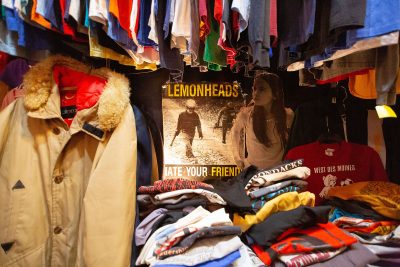Thrifting, sustainability and creating an outlet to express yourself — this is the premise of Fabrio, a new sustainable fashion magazine at Boston University.

The magazine and club was started by Eric Tran, a freshman in the College of Arts and Sciences. For Tran, president and production editor of the magazine, fashion goes beyond just clothes.
“Fashion is an expression of ideas, expression of passion,” Tran said. “Not just thinking about like, oh ‘clothes,’ [but] thinking about like, oh, ‘what can that do for other people?’ And as simple as fundraising, to give to organizations that clothe the homeless.”
The magazine’s efforts to be sustainable is reflected in its decision to publish digitally only, instead of in print.
“[For] all the clothes, we want to be reusing clothes, thrifting. We want to be using all sustainable things,” Tran said.
The other goal of the club is humanitarianism and activism. Fabrio plans to fundraise to help underserved communities who can’t afford clothes as well as work with anti-fast fashion organizations.
“We want to just take the level of artistry that comes from creating a simple magazine, to applying that to the real world and helping communities that actually need help,” Tran said.
Jasmine Grant, the editor-in-chief at Fabrio, said the magazine is about sustainable fashion, but also topics such as promoting sustainable working conditions and wages for workers in the fashion industry. Students were very engaged at the magazine’s interest meeting earlier this month, she said.
“[The idea of Fabrio] draws a lot of people in because maybe they’re reminded of thrifting or you know, recycling, clothing, sewing,” Grant, a freshman in the College of Communication, said. “But even beyond that, sustainable fashion is about promoting equity within the working class of the fashion industry.”
When it comes down to what inspired the making of Fabrio, the team said they believed in a vision –– sustainable fashion that was affordable and was for everyone. Tran said he came up with the idea last year when he wanted to fully commit to fashion and lead it toward sustainability.
“I feel like other people are in that same boat of being interested in something and not having an outlet to go for it so I just wanted to risk it and just start a sustainable fashion magazine,” Tran said.
For Tan, you can still look good and live sustainably without having to support fast fashion.
“Society does expect us to wear name brands and to be all over-the-top, but you don’t [have to be],” Tran, who strives for complete sustainability and thrifts as much as he can, said. “You can still express yourself through fashion without spending all this money.”
Wyatt Boyd, the photography editor of Fabrio, said he believes society needs to move away from a disposable lifestyle.
“We as a society are extremely wasteful. It is a materialistic society,” Boyd, a freshman in the College of Arts and Sciences, wrote in an email interview. “I think that there is far too much emphasis on new and trendy [than] on quality and agelessness,” he wrote.
Grant said she hopes Fabrio will inspire people to think more about fashion and their shopping habits.
“To evaluate your individual consumerism is really important in this day and age because it starts small,” Grant said. “Hopefully at the individual level, people will be reached to think about their own consumerism and their own habits that might have a harmful impact on the environment or other people at large.”
Fabrio will be publishing its first issue by the end of this semester.
Disclaimer: Jasmine Grant, the editor-in-chief of Fabrio, has written for The Daily Free Press but had no input in the writing or editing of this article.



















































































































